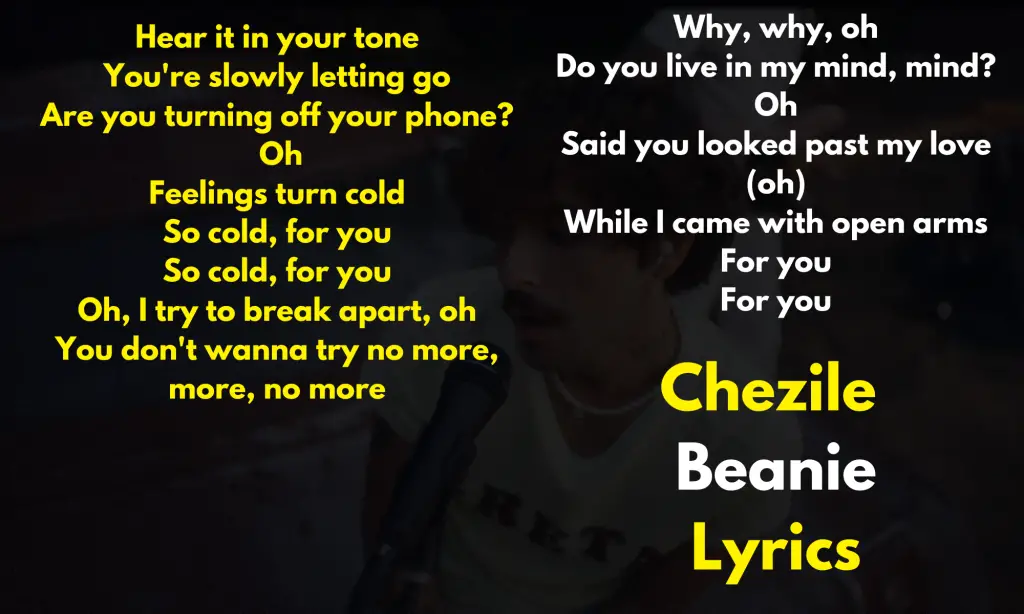Table of Contents
Image C/O 10k Projects Via The Beanie Music Video (Linked Below In This Article)
Chezile’s “Beanie” is a small and refined glimpse into the complexities of love and emotional detachment. With its blend of dreamy indie-pop production and raw, heartfelt lyrics, it has earned millions of streams and inspired countless TikTok creations. But what makes it resonate so deeply with fans is not just the song itself—it’s Chezile’s story. Earlier this year, he was homeless, bouncing between motels and Airbnbs. Now, with 800,000 daily streams and over 100 million Spotify plays, Chezile has gone from uncertainty to becoming a breakout artist. That lived experience, full of struggle and growth, brings a layer of authenticity to “Beanie” that can’t be faked.
When I listen to “Beanie,” I hear someone who knows what it’s like to feel forgotten but also knows how to hold onto hope. As someone with a background in English literature and creative writing, I find it fascinating how Chezile’s lyrics echo themes that have been explored by some of the greatest poets and writers.
Now, I’m not saying my take on the song is definitive. Everyone will have their own experience with it. But for me, the beauty of “Beanie” lies in how it bridges the modern and the timeless. It’s a song that’s deeply personal yet universally relatable, and it’s a perfect excuse to dig into those connections. Whether it’s through lines in the song like “Why do you live in my mind?” or the broader story of Chezile’s rise, “Beanie” invites us to reflect on the ways heartbreak and hope have shaped both art and life.
Chezile Beanie Lyrics And Meaning At a Glance
- It’s all about emotional distance: The lyrics reflect a slow, painful realization of someone pulling away, showing how subtle shifts can reveal deep fractures in a relationship.
- Unreciprocated love hits hard: The speaker’s vulnerability contrasts with their partner’s indifference, highlighting the imbalance in emotional investment.
- Lingering thoughts are the hardest to shake: Even after the love fades, the song captures how the memory of someone can live on in your mind, long after they’ve moved on.
Chezile Beanie Lyrics
Chezile Beanie Meaing
“Hear it in your tone / You’re slowly letting go”
This opening line sets the mood for the entire song. The speaker notices their partner pulling away, not through big actions, but in subtle ways, like the sound of their voice. That phrase, “slowly letting go,” tells us this isn’t sudden. It’s been happening over time, and the speaker is just now realizing it. The line captures how emotional distance often builds quietly, leaving one person trying to hold onto something that’s already slipping away.
Christina Rossetti’s “Remember” helps validate this idea. She writes:
“Remember me when no more day by day / You tell me of our future that you planned.”
Here, Rossetti talks about how someone can stop being present in a relationship. Like the song, her words show the pain of realizing that what you had isn’t the same anymore. Both explore that sinking feeling when you notice love fading but can’t do anything to stop it.
By starting with this quiet moment of realization, the lyrics set up a story about emotional distance and heartbreak. It’s a relatable experience that many of us have faced—trying to make sense of what went wrong when someone starts to drift away.
“Are you turning off your phone? (Oh) / Feelings turn cold”
This line pushes the emotional distance further. Turning off a phone is more than just a literal action—it’s a metaphor for shutting someone out. Phones are how we stay connected, so turning it off suggests the partner is cutting off more than just calls or texts. The phrase “feelings turn cold” brings a heavy emotional weight. The warmth of their connection is gone, replaced by something cold and distant.
Thomas Hardy’s “Neutral Tones” comes to mind here. He describes the end of a relationship with the line:
“Your eyes on me were as eyes that rove / Over tedious riddles of years ago.”
In both the poem and the song, there’s this sense of detachment. Hardy’s speaker notices how his partner’s gaze has lost its spark, just like the speaker in the song notices their partner emotionally shutting down. Both works capture that painful realization when love feels lifeless.
The song uses these moments of coldness to show how emotional distance can feel like rejection. It’s not just about losing someone—it’s about feeling the space between you grow larger, even when they’re still physically present.
“So cold, for you / So cold, for you”
The refrain hammers this idea of coldness home. By repeating “so cold,” the speaker emphasizes how deeply they feel the distance. It’s not just a passing observation—it’s a reality they’re living in. The phrase “for you” keeps the focus on the partner, showing that the speaker is still tied to them emotionally, even as things fall apart.
Hardy’s winter imagery in “Neutral Tones” feels like a perfect comparison. He writes:
“We stood by a pond that winter day, / And the sun was white, as though chidden of God.”
The cold, lifeless scene mirrors the emotional tone of the song. In both cases, the coldness isn’t just physical; it’s a symbol of how the relationship has lost its warmth. Both the song and Hardy’s poem use repetition and imagery to drive home the idea that love has grown distant and cold.
The refrain works so well because it’s simple but powerful. By repeating the same words, the song shows how that coldness dominates the speaker’s thoughts. It’s a feeling they can’t escape, and that repetition keeps the focus on the heartbreak.
“Oh, I try to break apart, oh / You don’t wanna try no more”
This part of the song gets more personal. The speaker is trying to pull away, but it’s hard when the other person has already given up. That line, “You don’t wanna try no more,” captures the pain of one-sided effort in a relationship. It’s heartbreaking to see the speaker putting in the work while the partner has already moved on emotionally.
Elizabeth Bishop’s “One Art” speaks to this struggle. She writes:
“The art of losing isn’t hard to master; / So many things seem filled with the intent / To be lost that their loss is no disaster.”
Bishop’s speaker tries to rationalize loss, but by the end of the poem, it’s clear they’re still deeply affected. Similarly, the speaker in the song can’t let go, even though their partner has stopped trying. Both show how hard it is to deal with loss, especially when the connection felt so meaningful.
This verse reveals the emotional imbalance in the relationship. The speaker is still fighting, still trying to hold on, while the partner has already checked out. It’s a common experience in breakups, and the song captures that heartbreak in a raw, honest way.
“Why, why, (Oh) do you live in my mind, mind?”
This line captures the fixation that often comes after a breakup. Even though the partner has moved on, the speaker can’t stop thinking about them. That repeated “why” shows frustration—not just with the partner, but with themselves for being unable to let go. It’s a moment of self-reflection that adds depth to the song’s emotional story.
Bishop’s “One Art” connects here again. In her poem, she writes:
“I lost two cities, lovely ones. / And, vaster, some realms I owned, two rivers, a continent. / I miss them, but it wasn’t a disaster.”
Just like the speaker in the song, Bishop’s speaker struggles with the memories of what they’ve lost. Both works show how hard it is to stop someone from living in your mind, even when you know it’s time to move on.
This part of the song dives into the psychological toll of heartbreak. The partner may be gone physically, but they’re still taking up space in the speaker’s thoughts. It’s a relatable feeling and one that the song handles with honesty and vulnerability.
“Said you looked past my love / While I came with open arms”
These closing lines are some of the most powerful in the song. “Looked past my love” paints a picture of being ignored or overlooked, even when the speaker was fully invested. The phrase “I came with open arms” shows vulnerability and a willingness to give everything, only to be met with indifference.
Christina Rossetti’s “Remember” offers a similar moment of emotional openness. She writes:
“Better by far you should forget and smile / Than that you should remember and be sad.”
Like the speaker in the song, Rossetti’s speaker is willing to give love selflessly, even if it means being forgotten. Both works explore the pain of giving so much and receiving so little in return.
The song ends with this stark contrast between openness and rejection. It’s a heartbreaking conclusion but one that feels true to the emotional journey. By the end, the speaker has laid everything bare, showing how deeply they cared, even if it wasn’t returned.
Let’s Connect All The Dots
At its core, Chezile’s “Beanie” is about emotional distance and the heartbreak of giving more than you get. When Chezile sings, “Hear it in your tone / You’re slowly letting go,” you can feel the quiet realization sinking in. It’s not just that someone’s leaving—it’s how small changes, like a tone of voice or turning off a phone, start to feel monumental.
That slow unraveling of a connection reminded me right away of Thomas Hardy’s “Neutral Tones.” Hardy writes about love losing its warmth, describing a wintry day with a sun “white, as though chidden of God.” The cold, lifeless feeling in his poem fits perfectly with how the song captures love fading in subtle but powerful ways.
Another big theme here is unreciprocated love—the pain of putting yourself out there and not getting the same in return. The line, “I came with open arms / While you looked past my love,” feels so raw because it’s something so many of us have felt. It’s that moment when you realize you’re ready to give everything, and the other person doesn’t even see it.
That imbalance reminded me of Christina Rossetti’s “Remember.” In her poem, she talks about love slipping away, saying, “Remember me when no more day by day / You tell me of our future that you planned.” It’s that same idea of one person still invested while the other is already moving on. Knowing Chezile’s backstory, going from homelessness to viral stardom, makes this vulnerability hit even harder—it feels like the song comes from a real, lived place.
The line that sticks with me most is, “Why do you live in my mind?” It’s such a simple way to describe something so complicated—the way someone can take up space in your thoughts, even after they’re gone. That kind of fixation connects with Elizabeth Bishop’s “One Art.” She writes, “I miss them, but it wasn’t a disaster,” trying to convince herself that loss isn’t such a big deal. But the cracks in her words tell another story, just like the cracks in the speaker’s voice in “Beanie.” Both are about wrestling with the weight of lingering attachments and realizing that letting go is easier said than done. For me, this is what makes “Beanie” so relatable.
It takes timeless themes like love, loss, and memory and makes them feel personal, modern, and real. That’s why it works.
The post Chezile Beanie Lyrics And Meaning: Exploring the Struggle of Letting Go appeared first on Magnetic Magazine.






